8 Reasons Why USA Swimming Shouldn’t Allow More Than One Team in Small Towns
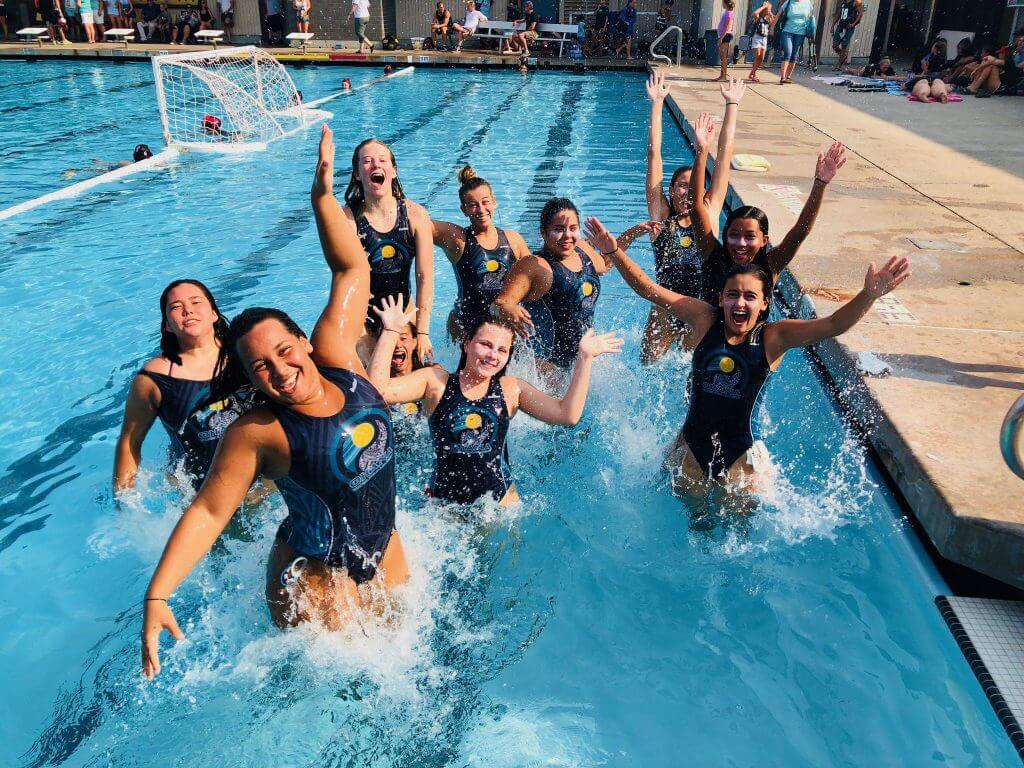
Commentary by Bailey Duran, Swimming World Intern.
Small town teams can have a very special dynamic. These teams have fewer numbers which can allow for closer bonds between swimmers, coaches and parents. In other words, everyone knows everyone! There are times, however, when disagreements rip swim teams right down the middle. In large towns or cities, swimmers can just move to a different team.
Being in a small town with only one team can make disagreements either easier or harder to handle. On one hand, it helps issues to be resolved because those involved are forced to work it out. On the other hand, when those involved can’t work out their differences and decide to create a new team, further drama can ensue.
In theory, a new team sounds like a fantastic idea. Get rid of the idea and philosophy that you couldn’t stand and start fresh. This may work in a city; however, in a small town, the aftermath of such a change can be almost catastrophic. This type of incident is becoming more and more of a problem.
Instead of a thriving team with swimmers working together in practice to be better, parents helping volunteer and split the load and coaches working together, you get two struggling teams trying to keep their head above the water. This situation causes many to ask, “Should USA Swimming allow more than one team per small town?”
There are many problems caused by more than one team in a small town.
1. It tears swimmers away from their friends.
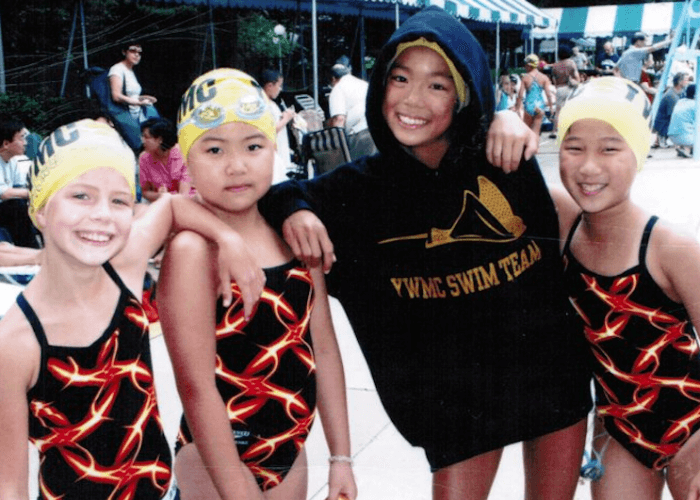
Photo Courtesy: Sophia Chiang
A team split in a small town can ruin friendships. Swimmers who were once lane mates pushing each other to be better no longer have someone to swim against. When teams split, swimmers lose the people they swim with and have no one with whom to pace themselves.
Beth Tate, swim mom and board member of the Sedona Swordfish swim team says, “When kids leave for the new team, they leave the other kids thinking that they are not good enough or they did something wrong. Friendships are broken.”
She also adds that these teams never truly bond because they don’t know who is staying and who is going to go to the new team.
2. It splits finances.
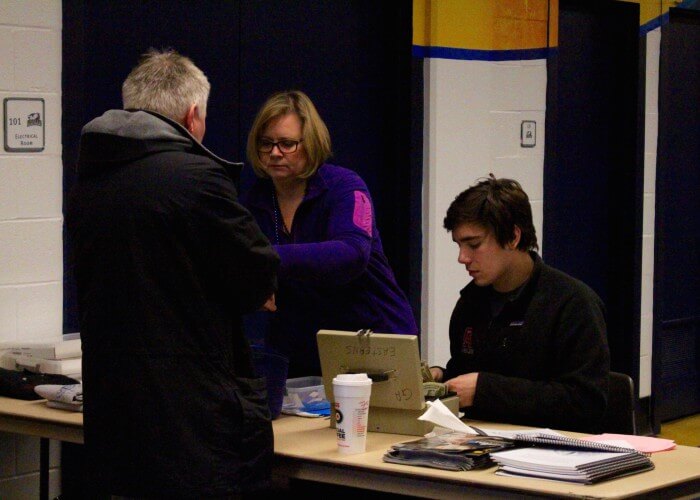
Photo Courtesy: Taylor Brien
Small town teams may not have a lot of funds to begin with and may require a lot of fundraising to stay afloat. When a team splits, so do the finances. This causes a lot of stress on the part of the board to make sure they are able to aptly pay their coaches and keep up with equipment needs.
None of the teams tend to be financially stable because they are both fighting for the money that the town and beneficiaries can offer.
Chris Cutrone, swim dad and president of the Cortez Leopard Sharks swim team, says, “Fewer swimmers on a team brings in less revenue. Less revenue cuts down on the number of coaches or quality of coaches a team can afford.”
Cutrone also points out that when a small town team has low numbers it is forced to charge more than normal to support coaches and to pay for pool time, training, equipment, etc.
3. It causes unnecessary drama.
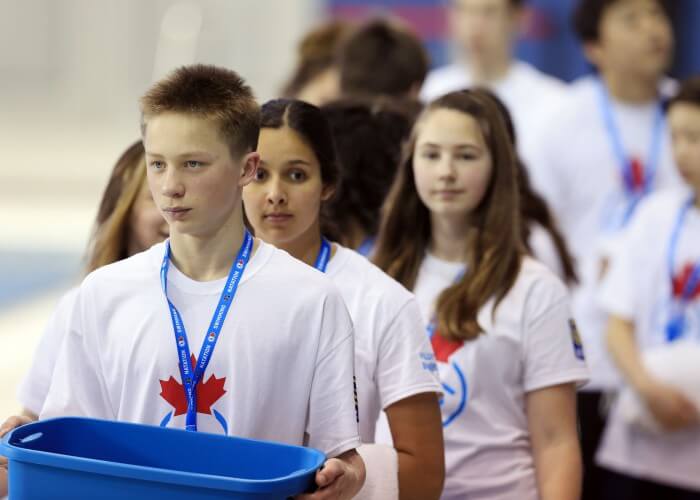
Photo Courtesy: Vaughn Ridley/Swimming Canada
According to USA Swimming, the main reason that children join swim team is to have fun. One of the biggest things that destroys fun is drama. Drama is not fun; in fact, drama destroys friendships and causes stress to all involved.
Conflict plays a huge factor in teams splitting, and the drama is transferred to all involved. It hurts people and causes swimmers to quit swimming and never turn back.
If every time a swimmer/parent got upset and started a new team, it would terminate the sport of swimming long-term.
4. It stretches people thin.

Photo Courtesy: Taylor Brien
A team split will eventually cause people to be stretched thin. When the number of parents on a team are suddenly cut in half, that leaves less people to get things done.
The remaining parents band together to fund-raise, time and volunteer at meets. Because there aren’t as many of them, these remaining parents get stuck doing everything and can easily get burned out. A team needs its parents to have a chance at being successful.
Tate adds to this by saying, “Parents wouldn’t be taxed so much because there would be more parents to share the load. Maybe the parents wouldn’t get so burned out because there would be less drama and fighting between clubs.”
5. It cuts down on pool time.
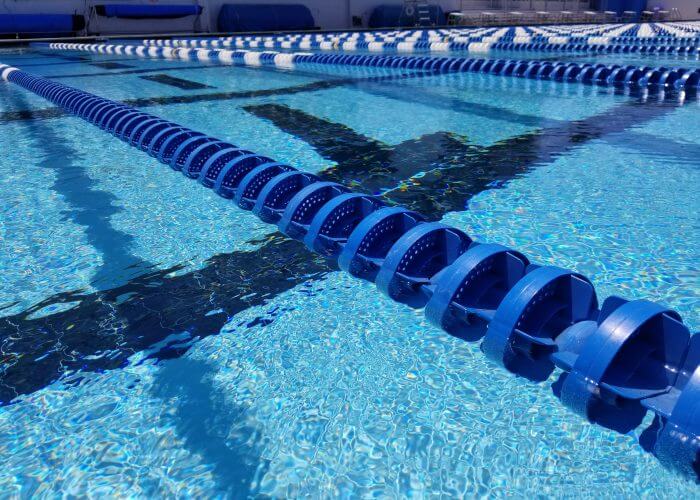
Photo Courtesy: Andy Ross
For a lot of teams, pool time can be an issue depending on management and other factors. Many of these towns only have one pool. A second team makes matters much worse, and getting adequate pool time becomes a nightmare.
It causes anger from the pool managers and stress on the part of the coaches as they try to get as much practice time as possible for their swimmers. This ultimately hurts the athletes, as they are not able to get as much pool time as their competitors.
Cutrone speaks from experience with this problem when he says, “Most small towns may only be fortunate enough to have one competition pool. Most pool managers don’t know how many days a week and hours a swimmer needs to spend in a pool to stay conditioned or competitive. Besides losing swimmers to another local team, competing for pool time is the second biggest problem a small town team faces.”
6. It creates problems for coaches.
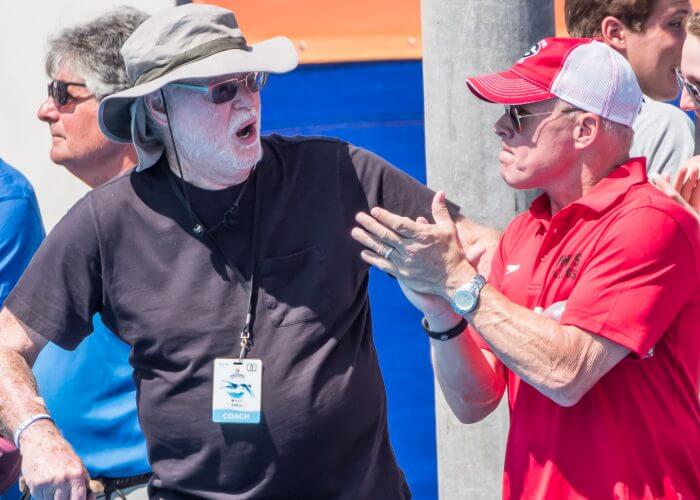
Photo Courtesy: Peter H. Bick
Small towns with multiple teams may have problems keeping coaches because of the drama that ensues from vying for pool time, having swimmers jump from team to team, and hostility from the opposing team’s coaches, swimmers and parents.
When a consistent coach can’t be found, the swimmers will struggle; they need to have stability to be able to meet their goals.
7. Hostility on deck.
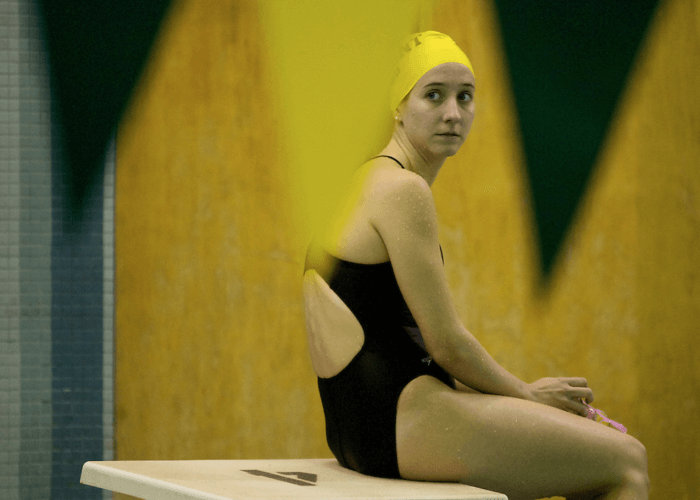
Photo Courtesy: Brian Jenkins – UVM Athletics
Teams in small towns that are born from arguments or drama will cause hostility on deck between the original team and the new team.
These hostilities can be directed from parent to parent, coach to coach, or swimmer to swimmer. This causes an uncomfortable practice environment if the teams overlap and will inevitably hurt the swimmers. It’s hard to focus on improving yourself when the tension is high.
8. An unhealthy competitive environment.
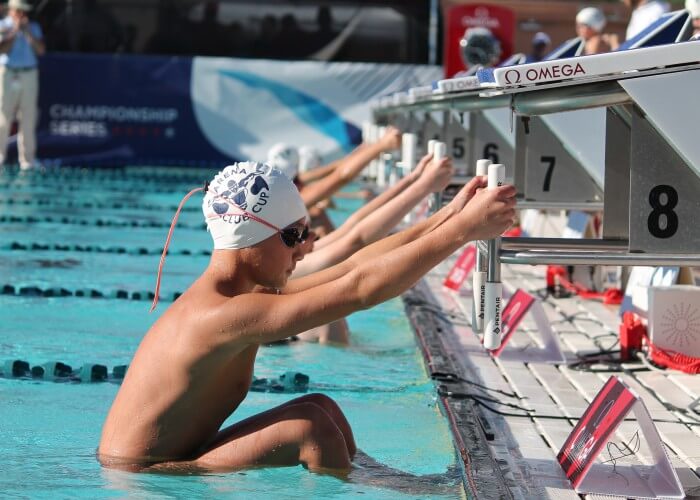
Photo Courtesy: Kara Sekenski
Multiple teams in a small town lead to an unhealthy competitive environment for the swimmers. Whether the coaches intend for it to happen or not, everything becomes about being better than the other team.
Who has the fastest swimmers? Who can cheer the loudest? Whose practices are more fun? Who has the most swimmers?
The coaches begin to focus on beating the other coach’s swimmers and putting pressure on their team to score higher than the other. It becomes a vicious cycle that the swimmers and parents get caught up in. It’s unhealthy to the swimmers and detrimental to their future in swimming.
Possible Solutions
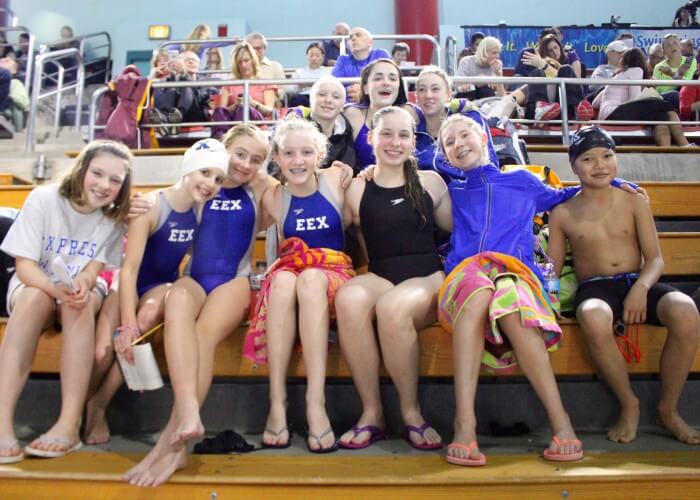
Photo Courtesy: Taylor Brien
There could be many proposed ways of fixing this problem. Unfortunately, it is a problem that is happening more and more often. Many times, this problem could be solved by parents putting away their egos and working with each other to do what is best for their kids.
According to Candi Duran, swim mom of four and Durango Swim Club board member, “Multiple teams in a small town creates lots of problems. I think this usually happens because of drama with the adults (board, coaches, parents). What the adults need to remember is we all started this sport because of our kids, and that is where the focus needs to stay. The swimmers should not be split and caught up in the politics and drama. We need to be adults and work out our issues for the sake of the kids.”
Perhaps another way to fix this current trend is for USA Swimming to get involved. The number of swimmers has declined noticeably, and part of the reason is related to drama and issues caused by teams splitting in these small towns. For example, in the tiny town of Cortez, a team that once thrived and had approximately 100 swimmers is down to 40 at most. Why? Because the tiny town of Cortez (pop. 9,000) has two swim teams who split due to disagreements and have pushed families away with their dramatic conflicts.
USA Swimming should look into the population of a town, team size, etc. before allowing another team to be charted in that town.
What other ways can you think of to help fix this problem?
All commentaries are the opinion of the author and do not necessarily reflect the views of Swimming World Magazine nor its staff.




Like saying there should only be one drug store or supermarket in a small town. Who decides which of the possibly several clubs is not allowed to exist and why. If one wants start a club team to earn a few bucks, isn’t it restraint of free trade to nix it?
Yes there are problems, but there is competition between clubs just as there is competition between swimmers. Let Darwin work his magic
Like saying there should only be one drug store or supermarket in a small town. Who decides which of the possibly several clubs is not allowed to exist and why. If one wants start a club team to earn a few bucks, isn’t it restraint of free trade to nix it?
Yes there are problems, but there is competition between clubs just as there is competition between swimmers. Let Darwin work his magic
NEW POST
Every town and every situation is different. That being said, I have watched EVERY one of the adverse issues described in this article come to pass in our small town over the last 20+ years when a team of 40+ years of tradition was fractured. I gave up being involved many years ago in our local swimming community and simply focus my attention on helping swimming grow at national, collegiate and international level.
Some good has come out of the multiple swimming programs in our community but so much more could have been achieved. When I meet knowlegeable swimming folks from around the country that know of our local situation they just shake their head. For those in the know, our community and the small town politics as it relates to swimming is viewed as a joke.
Prior to the division of a unified and broad based team effort, our community regularly produced many more lifelong swimmers and a many swimmers much higher level of achievement, including many who earned college scholarship opportunities. Those days are long past and likely to never return. Completely disheartening to have watched it happen in real time.
Several years ago, a VERY good national level club coach talked to me about applying for the job in our town with one of the teams. This coach would have been an amazing addition to our town. He was looking for a good opportunity to finish out the last 10 to 20 years of his career in a beautiful part of the country. As much as I would have loved for him to come to town, I warned him off very quickly and he is still with his club today. This coach is still producing top flight swimmers at the national and olympic level and our community continues to be mired in a mediocre effort at best.
Again, every situation is different. But good results have been sporadic at best and for the most part pretty lame and with plenty of of under achieving parents and coaches that don’t really get it. It should be noted that our community does not suffer from a lack of a quality facility. In fact, my town probably does less with more resources and a quality facility that most teams I know of.
The sad thing is that when folks read this they will likely think of a number of teams or town where this applies.
Love this! When I think of my final years of swimming, I think not just of my friends and the success I had, but sadly so many of my years were plagued with drama, team splits, and backstabs. So glad this issue is finally being addressed.
Why is this. Mission Viejo was a town of 10,000 people in 1968. Its still only 96,000. Small towns could have more than one team.